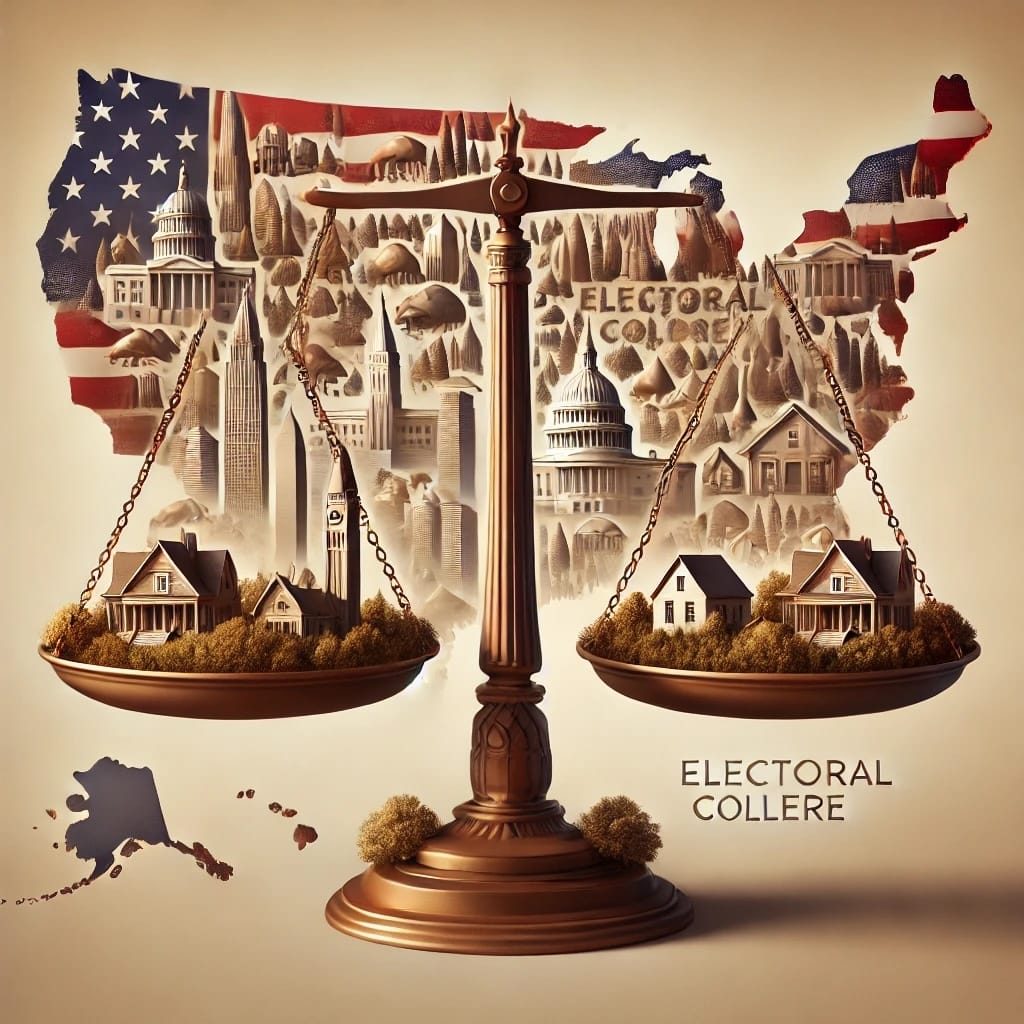Quick Thoughts on the Electoral College
I would say we should have civics tests, but I probably wouldnt trust who would administer them.

I saw this post, and it seems the Electoral College debate has reared its ugly head again. I was frustrated with the quality of the discussion, so I wanted to get my thoughts somewhere.
I'm always amazed at how many people want more than one vote per person, about 39% of Americans.
— Jimmy Dore (@jimmy_dore) October 7, 2024
They fear they wouldn't like the outcome if everyones' vote counted the same, so they like a system that gives some people more votes & some less.
There are a handful of… https://t.co/vcMgdhyxWA
Sometimes, it even shocks me how civically illiterate those with big audiences can be.
I'm unfortunately not surprised at the other 58%.
The Constitution is a contract between sovereign states
Sovereign is the keyword here.
The state you reside in is actually your primary form of government. You have a relationship with the federal government, sure, but it is only through the state you live in.
Electoral votes are decided by how many members in Congress represent your state. This means that the minimum would be three, as each state always gets two senators and then one House of Representative district.
This decision was a compromise at our country's founding to entice smaller states to join the Union. If you join and agree to the rules, you get a two-electoral vote starter pack representing the state's representatives in the Senate. Without it, smaller states would have little incentive to join. It would essentially be "sign up and get ruled over."
To illustrate this, let's take a book club hypothetical.
Imagine a book club that includes members from four different neighborhoods, all meeting as separate chapters:
- Maple Street: 50 members
- Oak Street: 30 members
- Pine Street: 15 members
- Cedar Lane: 5 members
Each neighborhood is diverse and different in its tastes but tends to align within its neighborhood. The book club leader loves the diverse representation of all neighborhoods and wants that participation to grow and add as much value as it can to everyone.
The leader wants to institute a new "democratic" way of choosing a new book. She thought of two ways to institute it.
First, she tried a direct popular vote.
In this process, every member casts one vote for the book they want to read, and the book with the most votes wins. The leader tried this briefly, but the same thing kept happening.
Because Maple Street has the most members, their preference almost always prevailed, leading to its dominance. As a result, members from Pine Street and Cedar Lane rarely saw their book choices selected.
Over time, these members from smaller neighborhoods felt their opinions didn't matter and stopped participating.
They concluded that they had better search for another book club or run a smaller one themselves.
To mitigate this, the leader tried something new: weighted voting.
With this new method, each neighborhood receives a certain number of votes that are not strictly based on the number of members, giving smaller streets proportionally more influence.
For example:
- Maple Street: 7 votes
- Oak Street: 5 votes
- Pine Street: 4 votes
- Cedar Lane: 3 votes
This arrangement means that even though Maple Street has the most members, they cannot solely determine the outcome, leading to a balanced influence among all neighborhoods.
Moreover, each neighborhood has agency on how to split or cast their votes.
Smaller streets like Pine Street and Cedar Lane now have meaningful input in the selection.
As a result, the book choices became more varied, reflecting the interests of the entire club, and members from all streets felt valued and continued to participate equally.
Ultimately, the book club leader chose the trade-off with higher participation. Either Cedar Lane and Pine Street are part of the book club, or it's a book club governed by Maple Street, which inevitably will become a book club of only Maple Street.
To that end, weighting the votes actually increased decentralization.
There are never easy answers when making big decisions like this; there are always trade-offs. Here, the trade-off is one person, one vote, potentially leading to centralization or weighting votes unequally to incentivize decentralization and minority participation.
The choice of enticing smaller, non-populous states is the choice our founders made. They agreed that this choice preserved our federalism and decentralization and best avoided centralization to a single state or tyrannical rule.
Similar to the book club, our presidential elections operate this way.
In this, your state throws its choice in the ring for who will lead over this Union of the states, not you. The Constitution stipulates that your state gets to decide how they cast this vote; it just so happens they all choose the majority vote today.
Each state gets to decide how they divvy up their electoral votes. Places like California say all go to the candidate that wins, while Maine decides to split them up, giving more agency to the district level. This process can be changed or amended via the state legislature.
If you change this, you fundamentally disrupt the relationship between the states, the federal government, and its citizens.
You are a resident of your state, which is sovereign and has its own Constitution.
You might think:
Well, we've evolved as a country, why can't we change it now?
There are many reasons this is impossible, but here is what I find the most limiting:
Throughout our history, states have controlled their rules for governing federal elections. The electorate controls this process through the state legislatures, where all election laws are supposed to originate.
Quick aside — one reason the 2020 election was controversial for many (including myself) is that many laws were changed by governors using Executive Orders under the pretense of COVID-19 emergency measures—but I'll leave that alone for now.
A state like mine — Florida — decides how it defines, rules, and judges who are constitutionally qualified to vote. I need to take steps to prove my citizenship, as well as slight differences in how they host primaries, party affiliation, etc.
A state like California says screw all that, it's illegal to even ask for an ID. So yes, they also get to decide who is constitutionally qualified to vote in federal elections based on legislation passed in their state legislature.
As a Florida resident, I — justifiably — have no vote or say in how California's state legislature legislates this issue. I only have recourse in my state.
If you removed the Electoral College, you would then need to pass federal election laws that would apply to every state removing their sovereignty to decide this for themselves.
Also, good luck getting anyone to agree or applying those laws.
Smaller states would have no incentive to stay. Or it may even incentivize them to join forces with other small states to get on the same footing as larger ones. Either choice would centralize to larger forms of government instead of smaller, more dispersed, local forms of government.
I, for one, think the Electoral College is a great thing and an ingenious invention. Without it, we have the tyranny of the majority and an even more centralizing force to a larger government than we have today.
In a country as wide-ranging and diverse as the United States, having to build coalitions across every state is a concept we must preserve and fight for.
States across our country are looked at as equals in a union. The Senate itself is a testament to that. Breaking it dissolves the very foundation of the equality that a federally elected official must view each state.
If this bothers you because it makes votes unequal, you must consider the alternatives and their consequences.
Living in California or New York, to achieve what you want, your best option is to convince Wyoming to secede. That would get you closer to this "one person, one vote" rallying cry you hear when the Electoral College and popular vote don't match.
However, if you like the benefits of Wyoming in the Union, this is the compromise you must make.
If you remove the Electoral College, states will secede, and honestly, I don't blame them.
In this, you cannot eat your cake and have it too. Either you want less populous states in the Union, or you don't. That is your choice. You cannot remove the last vestige of equality they have toward representation to the federal government. That's the trade-off. It's a compromise, not a perfect solution.





